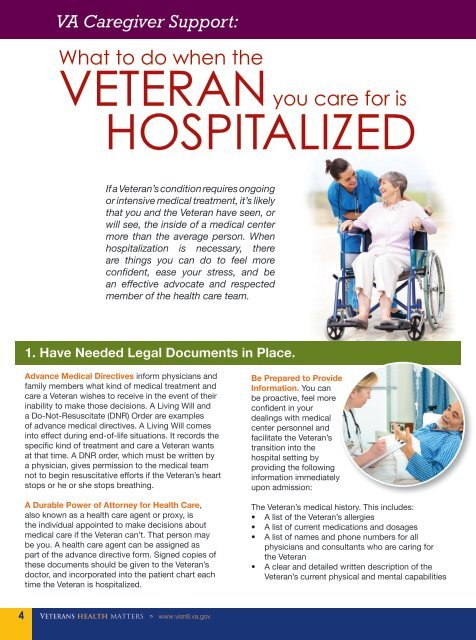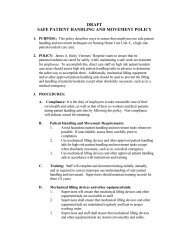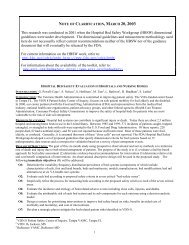English Version - VISN 8
English Version - VISN 8
English Version - VISN 8
Create successful ePaper yourself
Turn your PDF publications into a flip-book with our unique Google optimized e-Paper software.
VA Caregiver Support:<br />
What to do when the<br />
VETERAN you care for is <br />
HOSPITALIZED<br />
If a Veteran’s condition requires ongoing <br />
or intensive medical treatment, it’s likely <br />
that you and the Veteran have seen, or <br />
will see, the inside of a medical center <br />
more than the average person. When <br />
hospitalization is necessary, there <br />
are things you can do to feel more <br />
confident, ease your stress, and be <br />
an effective advocate and respected <br />
member of the health care team.<br />
1. Have Needed Legal Documents in Place.<br />
Advance Medical Directives inform physicians and<br />
family members what kind of medical treatment and<br />
care a Veteran wishes to receive in the event of their<br />
inability to make those decisions. A Living Will and<br />
a Do-Not-Resuscitate (DNR) Order are examples<br />
of advance medical directives. A Living Will comes<br />
into effect during end-of-life situations. It records the<br />
specific kind of treatment and care a Veteran wants<br />
at that time. A DNR order, which must be written by<br />
a physician, gives permission to the medical team<br />
not to begin resuscitative efforts if the Veteran’s heart<br />
stops or he or she stops breathing.<br />
A Durable Power of Attorney for Health Care,<br />
also known as a health care agent or proxy, is<br />
the individual appointed to make decisions about<br />
medical care if the Veteran can’t. That person may<br />
be you. A health care agent can be assigned as<br />
part of the advance directive form. Signed copies of<br />
these documents should be given to the Veteran’s<br />
doctor, and incorporated into the patient chart each<br />
time the Veteran is hospitalized.<br />
Be Prepared to Provide<br />
Information. You can<br />
be proactive, feel more<br />
confident in your<br />
dealings with medical<br />
center personnel and<br />
facilitate the Veteran’s<br />
transition into the<br />
hospital setting by<br />
providing the following<br />
information immediately<br />
upon admission:<br />
The Veteran’s medical history. This includes:<br />
• A list of the Veteran’s allergies<br />
• A list of current medications and dosages<br />
• A list of names and phone numbers for all<br />
physicians and consultants who are caring for<br />
the Veteran<br />
• A clear and detailed written description of the<br />
Veteran’s current physical and mental capabilities<br />
4 Veterans health matters » www.visn8.va.gov











